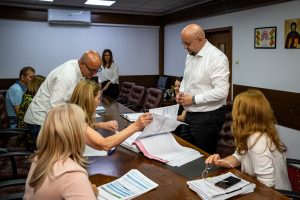“Minister David, when will you take action?” This was the question posed by Professor Martin Jan Stránský, a renowned neurologist and author of The Rise and Fall of the Human Mind, to Romania’s Minister of Education and Research during the conference Mental Health in the Digital Age. The event, organized by Q Magazine, took place on Tuesday, October 7, at the Patriarchal Palace and was moderated by journalist and former government spokesperson Mihai Constantin.
The conference aimed to sound the alarm about the growing danger of digital addictions, in the lead-up to World Mental Health Day on October 10.
- România și ai ei guvernanți, umiliți de Viktor Orbán pe propriul pământ: „O căpiță de fân cam strâmbă”
- „Ce face mintea, în epoca ecranului”. Avertismentul neurologului Martin Jan Stransky, la Conferința „Sănătatea mintală în era digitală”
- Testimonies from the online inferno and a stark admission from Health Minister Alexandru Rogobete: Romania is currently unable to treat mental illnesses caused by digital addiction.
- Premiul Nobel pentru pace nu i-a revenit lui Trump. Laureata este Maria Corina Machado, om politic din Venezuela
- INS: Se menține sporul natural negativ al populației României
A Phenomenon That Demands Research
“If we’re so concerned with protecting the external environment, I found it just as important to address the inner environment, the reflection of our psyche,” said Floriana Jucan, founder of Q Magazine, during her opening remarks.
“You might be surprised to learn that no one under the age of 18 can access either online or physical casinos in the regulated gambling industry. Anyone wishing to play an online gambling game must complete extensive forms and verify their identity using official documents and real personal data. Yet none of these safeguards apply to social media platforms, which we now understand can foster harmful addictions.”
“We also organized this debate because, through our journalistic research, we found that there are no national statistics on the phenomenon of addiction,” Jucan added. “And I believe it’s impossible to craft effective public health policies without a clear and accurate mapping of this growing pathology.”
The event gathered government ministers, parliamentarians, doctors, sociologists, representatives of civil society, and the Romanian Patriarchate.
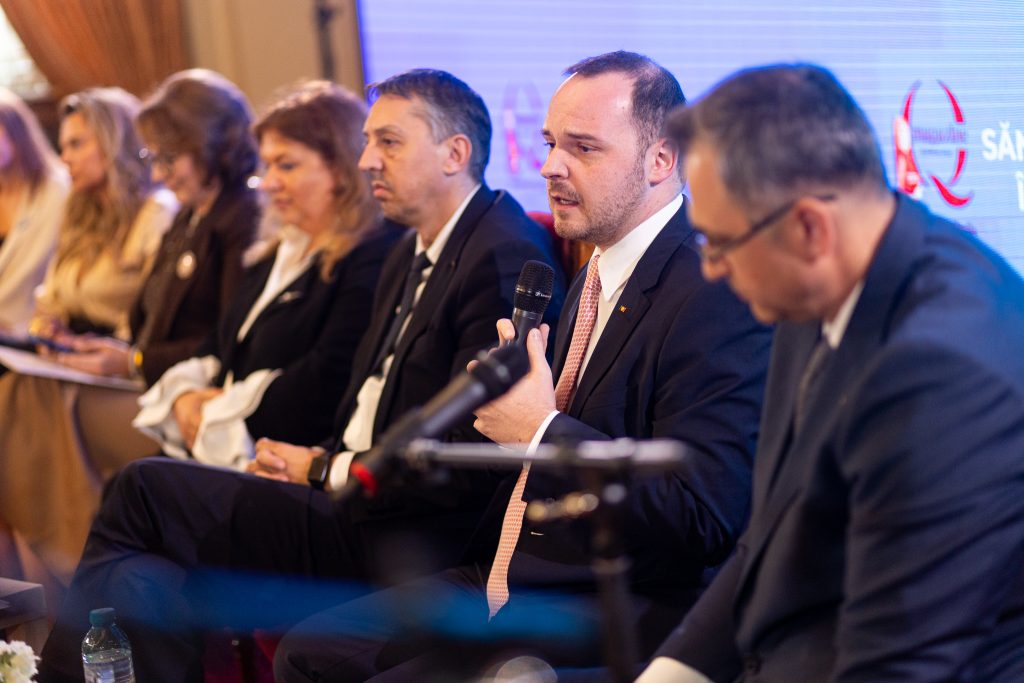
Among the key participants were: Alexandru Rogobete, Minister of Health; Daniel David, Minister of Education and Research; Senator Nicoleta Pauliuc, initiator of the “Online Adulthood Law” (which proposes mandatory parental consent for children under 16 who wish to open social media accounts); Senator Carmen Orban, member of the Senate Health Committee; Anna Riatti, UNICEF Representative in Romania; Father Florin Petre; as well as child psychiatrists, psychologists, and sociologists.
The event’s special guest was Dr. Martin Jan Stránský, Clinical Assistant Professor of Neurology at Yale University and author of The Rise and Fall of the Human Mind.
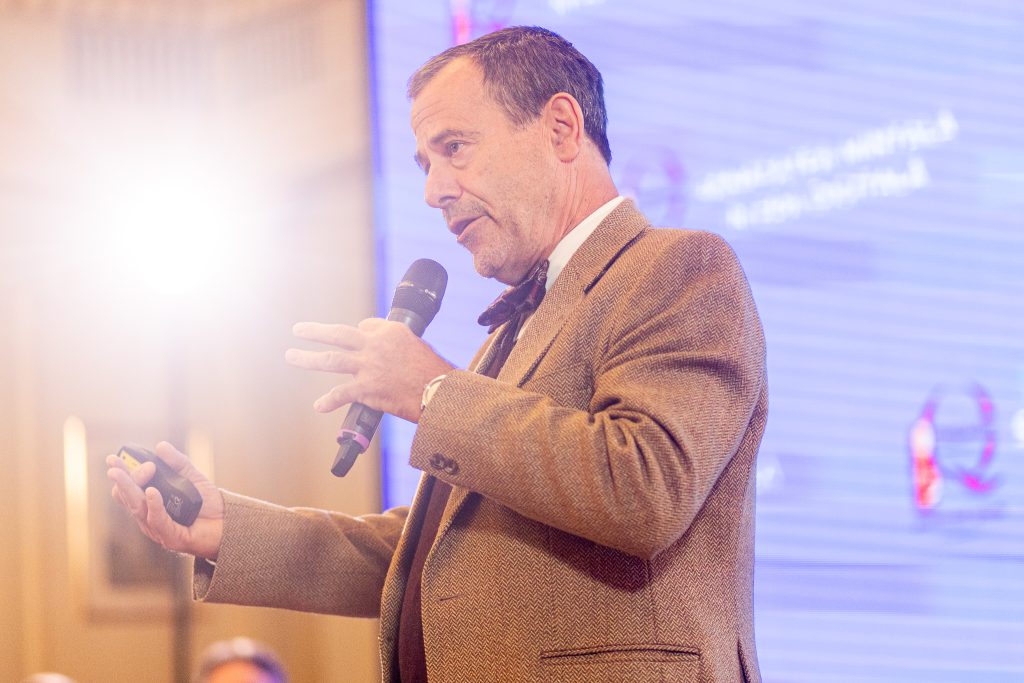
In his keynote address, Dr. Stránský presented findings from research conducted over the course of his career:
“We are getting dumber. IQ levels stopped rising after the year 2000.
Year by year, in every country—including yours—people are increasingly unable to write a simple 20-word sentence by hand,” he said.
“The farther away your phone is, the better your memory functions.
The research is clear: mobile phones shouldn’t just be removed from classrooms—they should be removed from schools entirely. This isn’t an opinion; it’s a scientifically documented fact.
And the worst of all? Social media.
Sean Parker, Facebook’s first president, openly admitted: We’re exploiting human psychology. We know exactly what we’re doing, and God only knows what it’s doing to our children’s brains.
Dopamine, the brain’s feel-good chemical that links the decision-making frontal lobe to the emotional centers, has become dependent on a thumbs-up or thumbs-down. On a like or a dislike.”

The creators of the technology were fully aware of these issues. Tim Cook, Bill Gates, and Steve Jobs did not allow their own children to use the very devices they invented. Although Jobs pioneered the iPad, his children never had one at home.
They controlled the technology.
They enrolled their children in Waldorf schools, institutions known for their no-computer policy.
UNESCO has proposed banning mobile phones in all schools worldwide.
“Minister David, when will you do the same? Sixty-nine countries have already taken this step!” the neurologist challenged the Minister of Education.
Stránský highlighted that “excessive phone use is associated with poorer academic performance and emotional instability,” citing a 2023 study by Sweden’s Karolinska Institute on computers in schools, which presented “clear evidence that digital technology hinders students’ learning more than it helps.”
“The experts recommend a return to printed textbooks.
Sweden is already phasing out computers in schools.
Two hundred and forty studies from OECD and MIT confirm that students who frequently use computers achieve worse results. These are neurological facts.”
On the topic of AI and ChatGPT, Professor Martin Jan Stránský referenced a recent MIT study showing that “people who use ChatGPT for more than three months experience a 47% reduction in brain connectivity; 83% cannot recall what they wrote; and, most alarmingly, after stopping usage, their brains do not fully recover.”
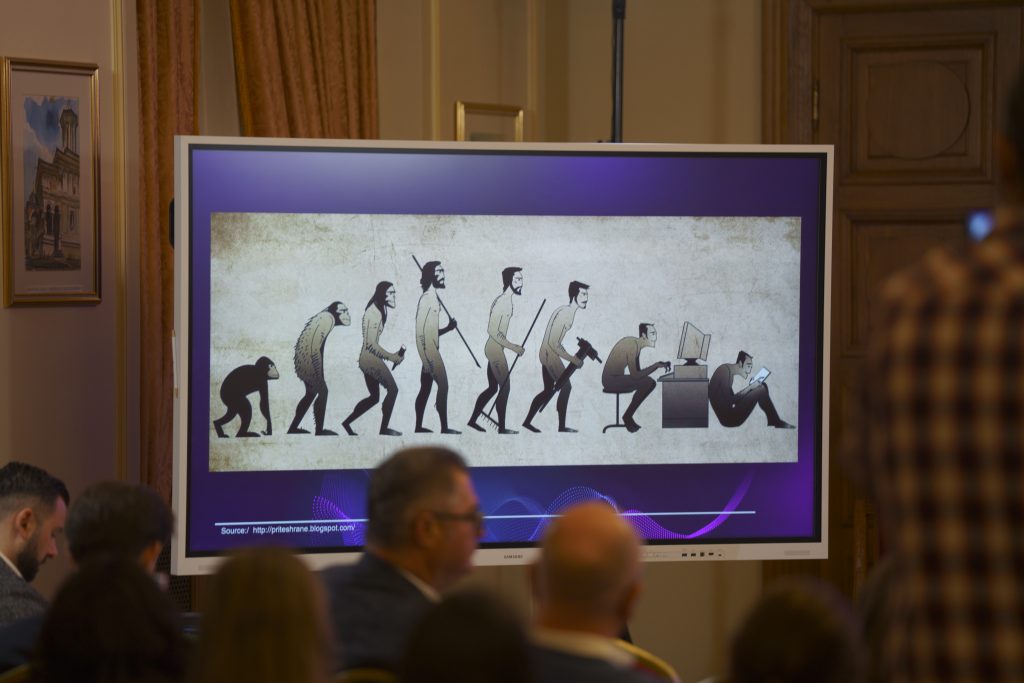
“Digitalization makes thinking optional. The brain learns through mistakes. If no one pushes you to think, no new neural connections form,” the neurologist emphasized during his address.
“Is there any study showing that digitalization has improved academic performance anywhere in the world? If you show me even one, I will stop this presentation. I am not aware of any,” Stránský stated, calling for a reduction in access to and consumption of online content.
Other speakers included Prof. Dr. Alexandru Vlad Ciurea, Scientific Director at Sanador Clinical Hospital; Dr. Iustinian Ioachim Simion, Head of Neurosurgery at the Military Hospital in Cluj-Napoca; Dr. Adrian Abagiu from the National Institute of Infectious Diseases “Prof. Dr. Matei Balș”; Dr. Lucian Constantin Paziuc, President of the Romanian Association of Public Psychiatric Hospitals; Cătălina Constantin, Director of the National Center for Mental Health and Anti-Drug Efforts; and Dr. Emanuela Andrei from “Prof. Dr. Alexandru Obregia” Clinical Psychiatry Hospital.
IRES STUDY COMMISSIONED BY Q MAGAZINE
A highlight of the event was the presentation by university professor Vasile Dîncu of the groundbreaking study “Romania in the Age of Hyperconnectivity,” conducted for the first time in Romania by the Romanian Institute for Evaluation and Strategy (IRES) at the request of Q Magazine.
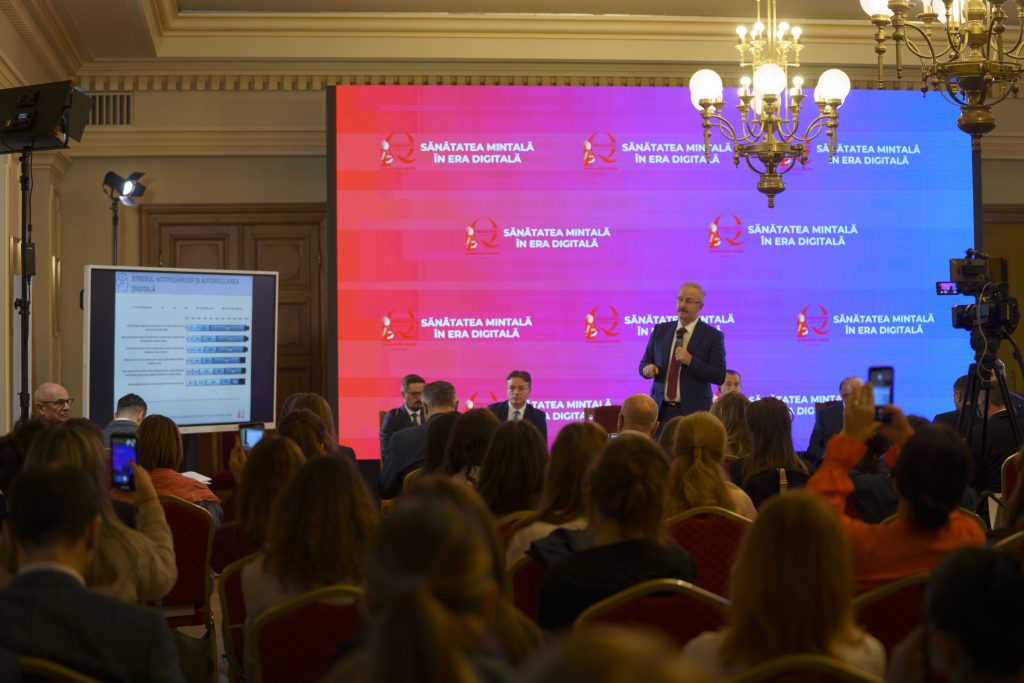
The research revealed two paradoxes, according to sociologist Vasile Dîncu.
First, despite 90% of Romanians being connected to the internet, the country lacks public policies and institutions dedicated to the online environment and the mental well-being of its users.
The second paradox: “The more connected you are, the lonelier you become,” Dîncu explained.
“The great paradox is that while we are super-connected ,hyper-connected even, at the individual level, when we measure social engagement, we find that people are actually very lonely.”
“In sociology, we know that the most important factor for psychological well-being is contact and feedback from others. And that’s exactly what’s missing: human connection,” said the founder of IRES.
His conclusion: “Digital well-being must become a public policy priority in Romania, a key government strategy, an educational strategy, so that we can learn to coexist with digital technology.
“We need to learn how to live with digital tools, make use of their benefits, and stay healthy with clear minds.”
GAMBLING ADDICTION AMONG CHILDREN
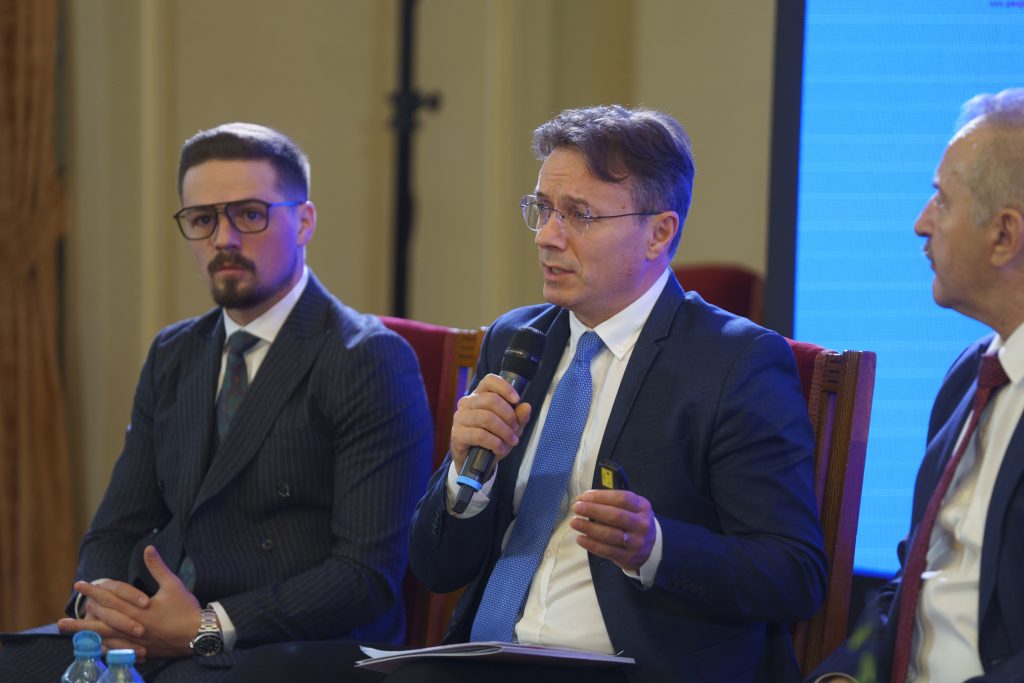
George Roman, Advocacy Director at Save the Children, presented a study by the organization showing that although the law prohibits children from accessing gambling, 14% of children reported having gambled for money, and 40% said they have friends involved in such activities.
Additionally, 7 out of 10 children said they have seen outdoor advertising for gambling.
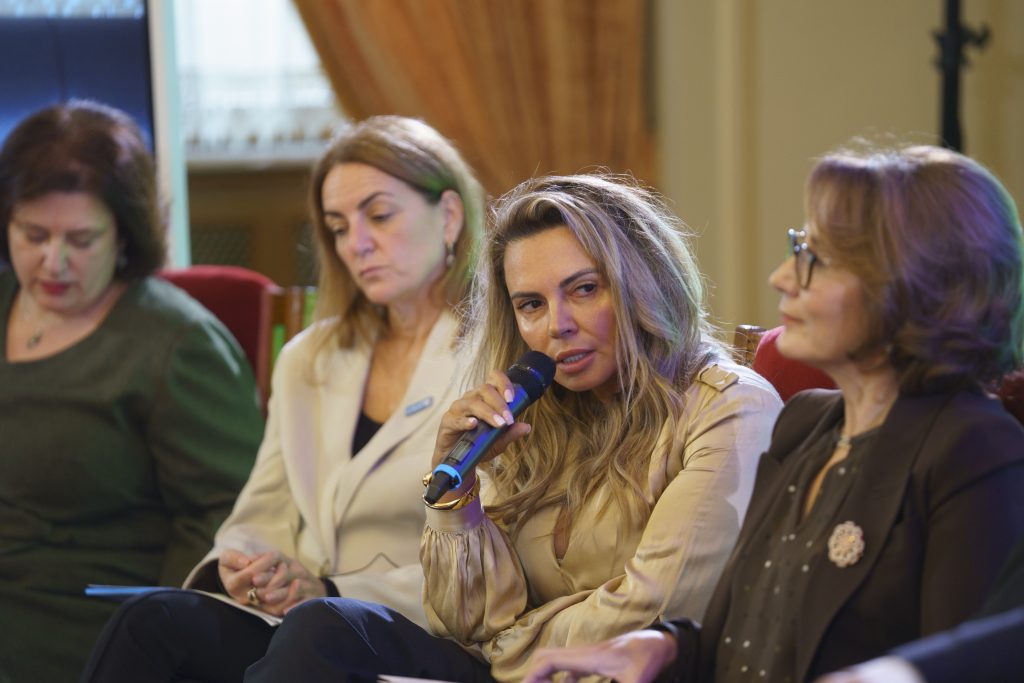
Invited to the conference, Odeta Nestor, President of the Association of Remote Gambling Operators and former Director of the National Gambling Office (an agency under the Ministry of Finance), urged participants to try accessing a legal operator’s website live. They would find that age filters, ID verification, and registration forms effectively exclude minors. In contrast, on the black market—unregulated and illegal—there are no such restrictions or controls by authorities, often creating confusion between the legal, taxed, and regulated market and the illicit one.
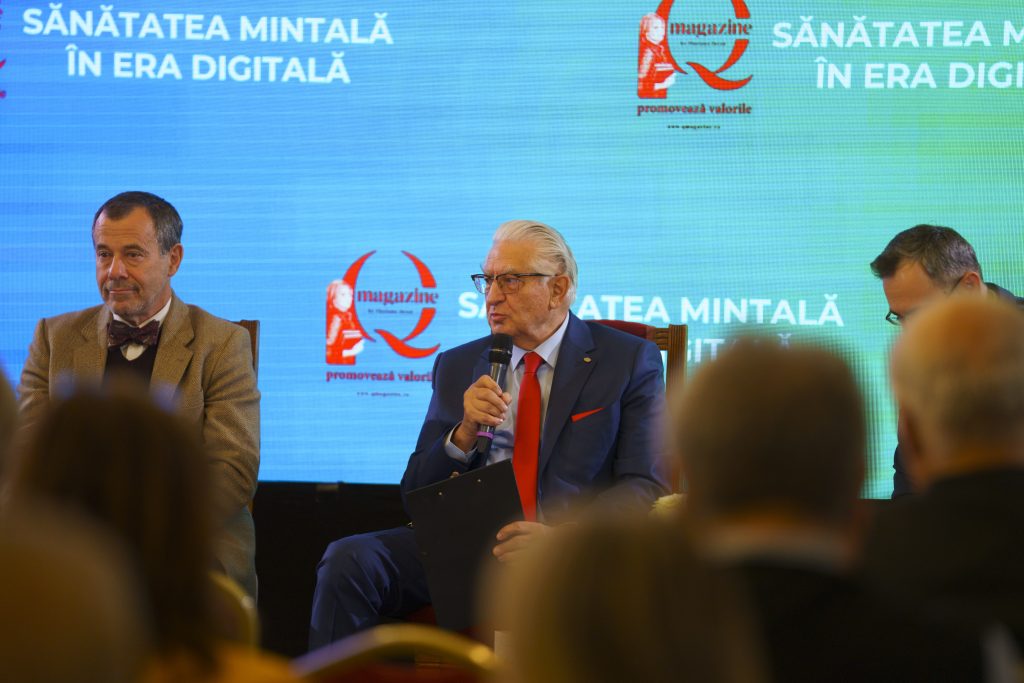
Prof. Dr. Vlad Ciurea, Scientific Director at Sanador Clinical Hospital, warned that “We must control technology, not let technology control us!”
“I don’t sleep with my phone, I don’t keep it near me. Even though I was always on call as a hospital director, I kept it three or four meters away. But I’ve seen people who sleep with their phones in bed, which is a serious problem,” the doctor revealed.
As a personal example, he uses his phone at least an hour and a half after waking up.
Prof. Dr. Radu Țincu, Head of the Intensive Care Unit at Bucharest Emergency Clinical Hospital and author of the book Overcoming Addiction, drew attention to the rising number of young patients admitted in critical condition due to drug use.
“It has been very rare for me to perform an MRI on such a patient and find only one toxic substance present. Usually, they consume multiple types of drugs,” said the doctor, who noted that after a certain point, the human body starts to tolerate very high amounts of substances.
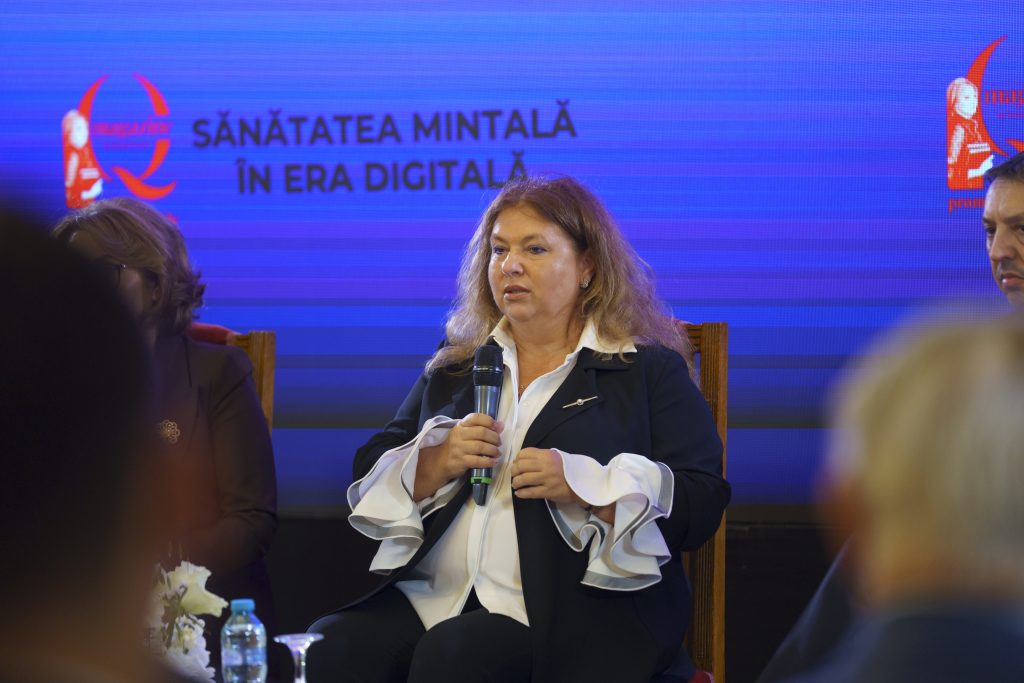
Prof. Dr. Carmen Orban, senator and member of the Health Committee, as well as coordinator of the Mental Health Plan adopted by the previous government through a Memorandum, called on state institutions to cooperate in order to effectively implement the actions outlined in the plan.
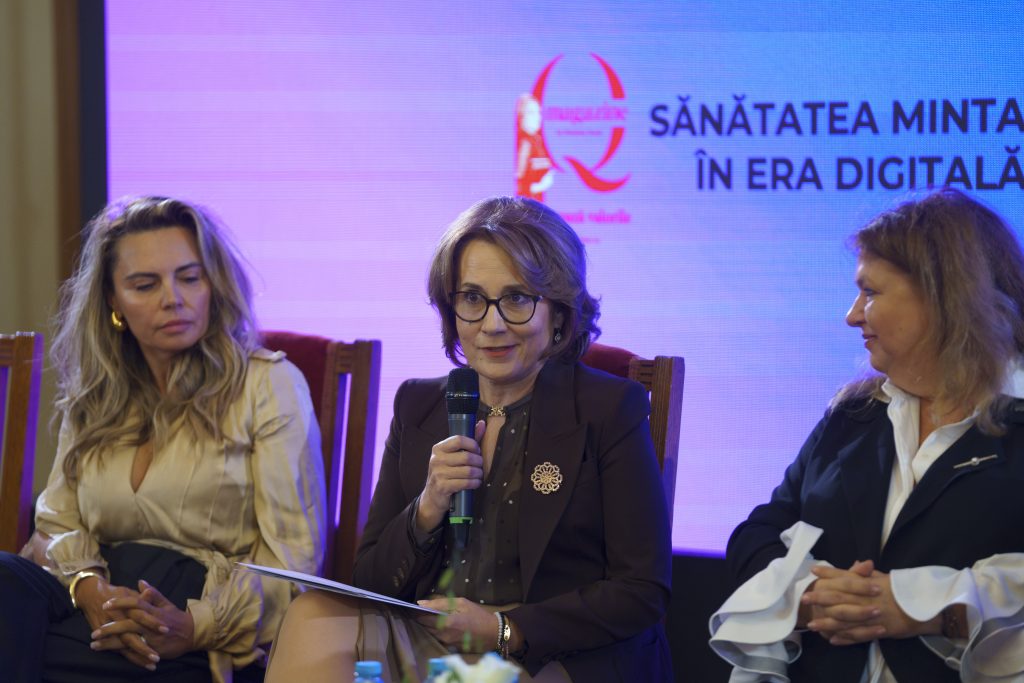
Senator Nicoleta Pauliuc has made it her mission to protect minors from harmful content accessible through online services. Two years ago, she introduced the Digital Age of Majority Law.
Under this legislation, young people under the age of 16 will only be able to create social media accounts with parental consent. “We are not banning technology or access to social media; we are engaging parents as partners,” Pauliuc emphasized during the “Mental Health in the Digital Age” conference.
The law has been approved by the Senate and will now proceed to the Chamber of Deputies, which holds the final decision-making authority.

Representing the Romanian Orthodox Church was Father Florin Petre, patriarchal secretary and charity priest at the “Professor Doctor Alexandru Obregia” Clinical Psychiatric Hospital in Bucharest.
“Until about two decades ago, we mainly discussed classical addictions such as alcohol, tobacco, and drugs. Today, the reality of digital addictions demonstrates that technology—a highly valuable tool—can become a destabilizing factor when used excessively and without control,” Father Florin Petre said.
Through its Federation Philanthropy, the Romanian Orthodox Church has trained over 500 addiction counselors who have become important resources within their communities. The Church has also conducted a digital addiction prevention campaign in schools, training 140 teachers and reaching nearly 2,500 students and over 500 parents.
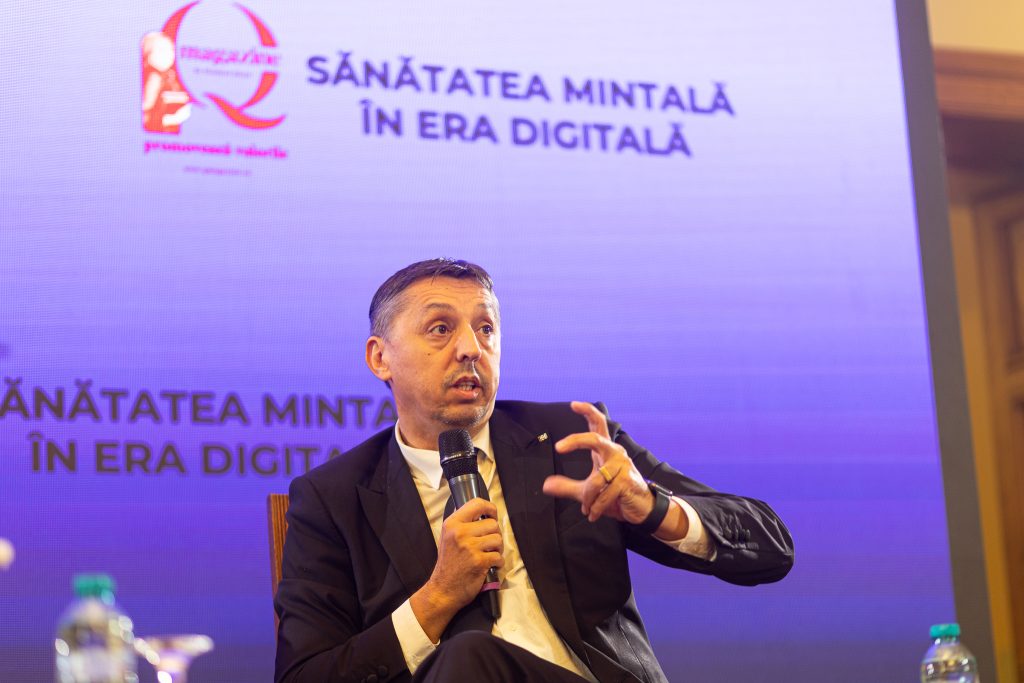
Minister of Education Prof. Daniel David emphasized that, from his perspective as both a psychologist and a government official, technology can serve either as a positive tool or a weapon of destruction, depending entirely on how it is used.
“Looking back at history, nearly every industrial revolution was anticipated as a catastrophe. People feared automation would destroy personal, individual aspects of life. Computers would drive us mad and take our jobs. Today, naturally, we face yet another industrial revolution that many again view as catastrophic.
For me, as both a minister and psychologist, technology in itself is neither inherently good nor bad. Its value depends on how we use it.
While the amount of time spent on technology matters, even more important is the content. This content must be co-created with parents and teachers and, as Professor Stránský highlighted, it should enhance abstract thinking skills, because AI systems provide the solution, but not the path to that solution,” Minister David explained.
“OECD studies show that ignoring technology in schools puts children at a competitive disadvantage. My conclusion, as both a psychologist and minister, is that we must protect mental health through a clear understanding: negativity is not the enemy; negative emotions have their place. Accordingly, I introduced subjects such as Self-Knowledge and Personal Development and Emotional Self-Regulation into the high school curriculum, and I have worked to create greater access to counseling services in schools by adding more counselor positions,” he added.
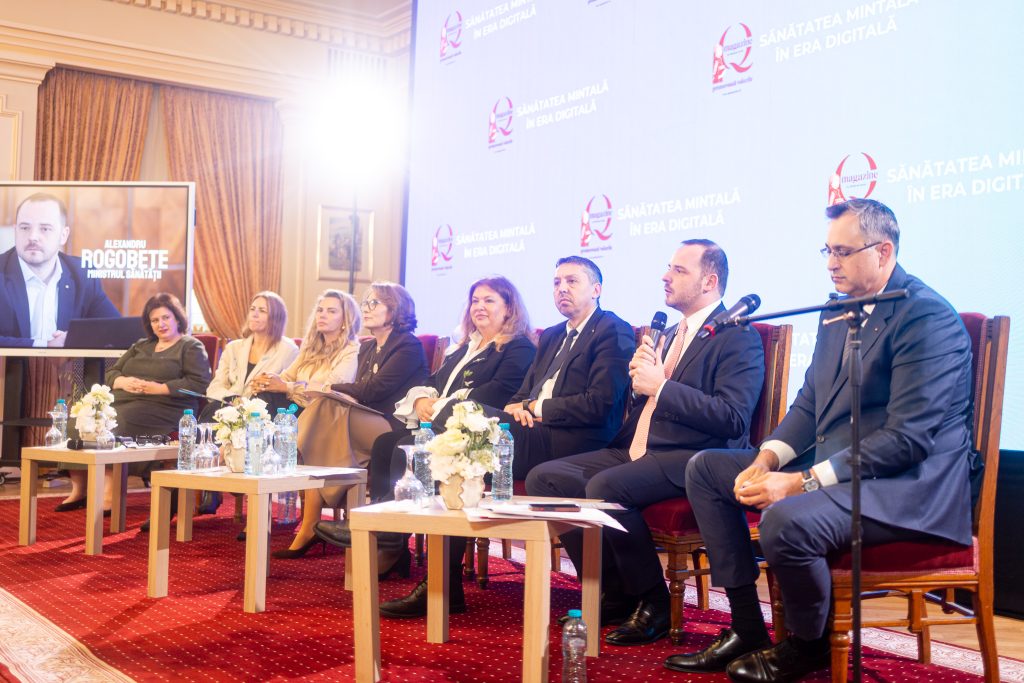
Alexandru Rogobete, Minister of Health, acknowledged that currently, addictions and their destructive effects cannot be adequately treated within the public healthcare system.
“I’m telling you, regardless of what anyone says, that today in Romania, the Ministry of Health, which is responsible for public health policies, does not have a strategy addressing addictions in the virtual space. There is no functional mental health center in Romania capable of counseling and treating minors and adolescents suffering from virtual space-related addictions.
Perhaps such centers exist on paper, but in reality, they do not. And yes, this is one of our objectives,” stated Alexandru Rogobete, announcing plans to build six dedicated mental health centers in the near future.
TESTIMONY FROM HELL

One of the conference’s most powerful moments came from the testimony of Roxana Dima, mother of a 12‑year‑old boy who battled a mental illness fueled by social media.
“2023.
Anorexia nervosa.
David, 12.
One banana every two days — measured and weighed.
Fourteen months of hell.
Not even in my worst nightmares did I imagine that my David — my sunny boy, always smiling, fluent in two foreign languages, a competitive athlete in both swimming and football — could fall prey to one of the most insidious and dangerous mental illnesses known to medical science.
According to official EU figures, anorexia nervosa carries a 20% mortality rate.
In short, those diagnosed with an eating disorder starve themselves until their organs fail and they die. Over the long term, suicide rates are alarmingly high.
This pathology typically ensnares preadolescents, who — due to a mix of low self‑esteem, vulnerability, traumatic personal events and bullying — eventually succumb to harmful online influences on platforms such as TikTok and Instagram.
In Romania, the condition is almost phantom‑like. You must be very lucky to find a doctor who will make the correct diagnosis, and crucially, make it in time.
Before we reached Obregia Hospital and Dr. Florentina Rad, I heard things like: Come on, madam, it’s just attention seeking!, He needs a beating!, It’s food intolerance! even Sedate her and force‑feed her!”
The full testimony can be read here.
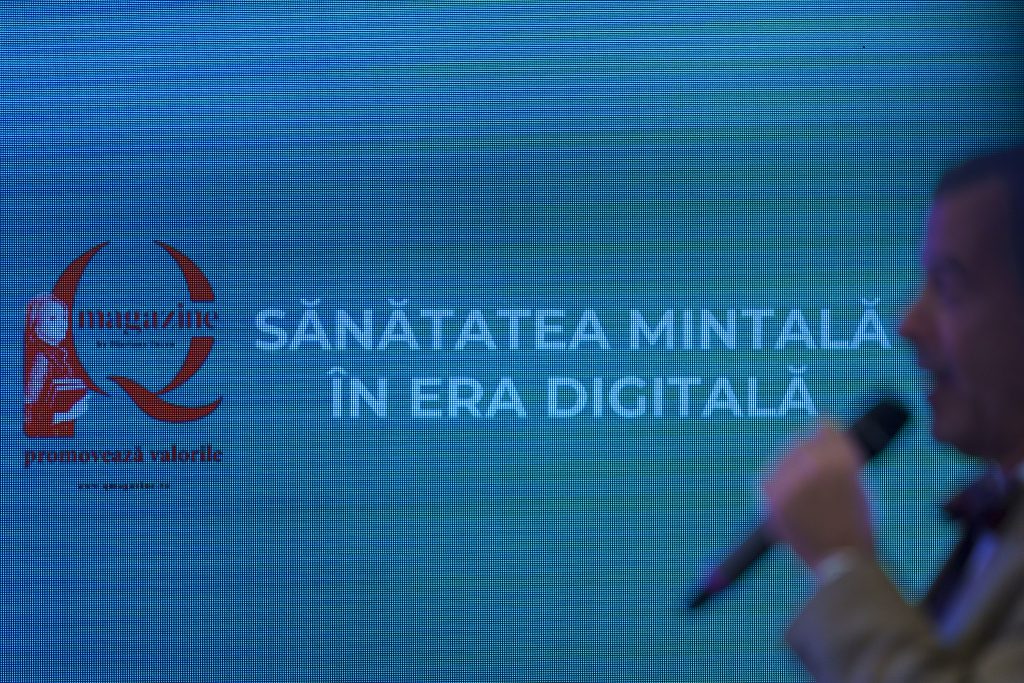
Q Magazine set out to highlight through the conference “Mental Health in the Digital Era” that technology represents progress for humanity, but excessive use can lead to illness and, ultimately, dehumanization. As Professor Jan Martin Jan Stránský stated, “we are social animals, not digital animals.”
The event was supported by Eco Sud, Claroty, Adrem, AOJND, and Sanador Clinical Hospital.
Media partners included Kanal D, the BASILICA Trust, and the Gândul Trust.














